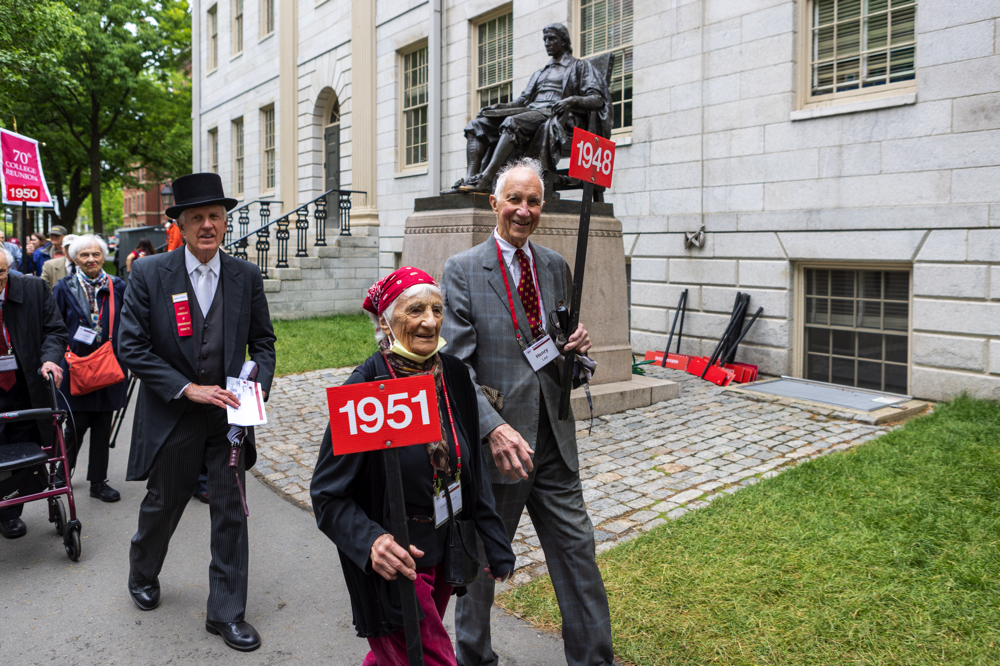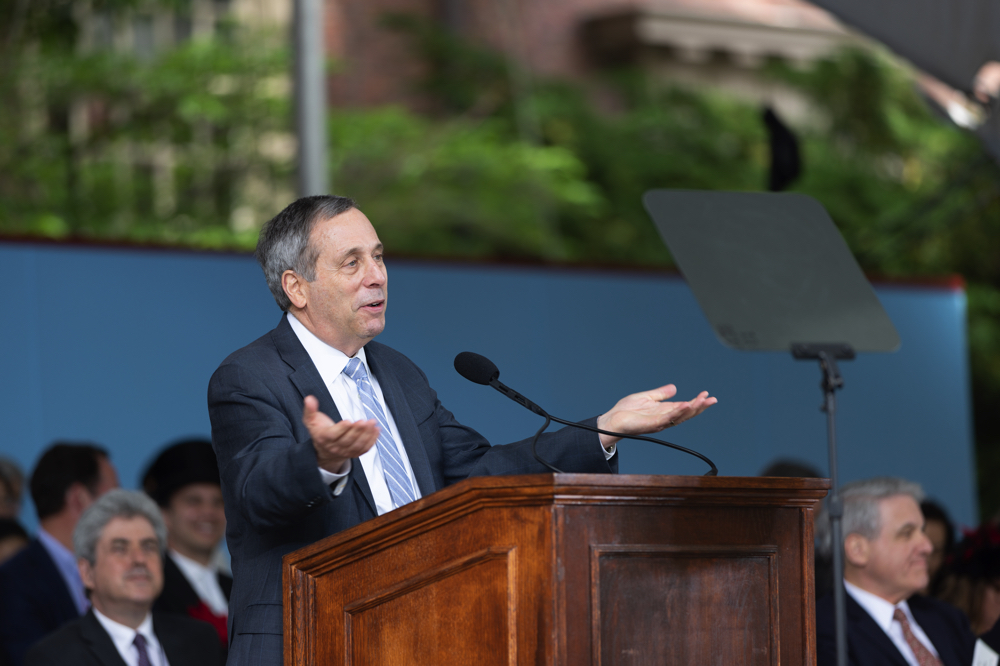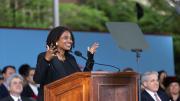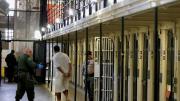To the tune of bagpipes, crashing cymbals, and horns, University alumni paraded into Tercentenary Theatre for the first- stand-alone Alumni Day. The event honored the global Harvard community, particularly alumni attending reunions this year, from class years ending in -2 and -7. It was the first time alumni have gathered in-person since 2019, uniting Harvardians across generations—including the senior-most alumnus representing the Class of 1948. And it brought to a close a crowded celebratory period encompassing the class of 2022 Commencement and the make-up celebration for the classes of 2020 and 2021, on May 26 and May 29, respectively.
The crowd was jubilant, if a bit sparse. The folding chairs stretched to Widener Library, but the alumni filled only about one-third of the seats. Nevertheless, spirits were high as Harvard Alumni Association (HAA) President Vanessa Liu ’96, J.D. ’03, took the stage. She delivered a land acknowledgement to the indigenous people upon whose land Harvard is built, then pounded the ceremonial gavel to ring in the 152nd annual meeting of the HAA.

The senior-most alumna (Class of 1951) and alumnus (Class of 1948)
Photograph by Michael D. Spencer/ courtesy of Harvard Alumni Association
After holding a moment of silence for alumni who have passed away, Liu introduced a brief video montage of Harvard alumni volunteers across the world. Representing countries from Argentina to Liberia, the graduates gave a brief homage to a University that they called home no matter how far they found themselves from Cambridge.
When the video ended, Liu proudly described the significance of the day’s events—the first Harvard Alumni Day in University history. While it was a unique opportunity to celebrate the alumni community, she used her speech to advocate for the importance of action. “These are times of uncertainty and turmoil,” she said. “I wish I could say that the times we’re living in are better than when we graduated, but for many of us, it isn’t.”
During the last year, she said, she has been reflecting on what it means to be a citizen and citizen leader educated by Harvard. She broke down the responsibilities into components. The first is to embrace and have empathy for differences. “When we were here as students, we were immersed in a sea of differing ideas, differing perspectives, differing beliefs, differing cultures, differing interests,” she said. “For democracy to prevail, we have to make sure we continue to hone the skills of civil discourse with integrity. Our 400,000-strong alumni community should be a model for this.
The second was to celebrate collective commonality. She shared a story about visiting the Soviet Union during the Cold War, when she was 14 years old. Though she expected to be on the defensive, she ended up bonding with other students over their love of Duran Duran, Billy Joel, and Stevie Wonder. “In moments of uncertainty, in moments of turmoil,” she said. “Finding a connection with someone you thought of as ‘the other’ makes all the difference.”
And third, “It’s about taking action towards positive change.” She cited alumni responses to the pandemic, the murder of George Floyd, and the Russian invasion of Ukraine—many of which spanned groups of alumni from countries around the world: “It’s been inspiring to watch our alumni community create points of intervention, to lift each other up. As citizens and citizen leaders, we must act on behalf of others, not just ourselves.”
Liu first gave a shout-out to soon-to-be Supreme Court Justice Ketanji Brown Jackson ’92, J.D. ’96, seated in the audience, and hailed the tenure of Philip Lovejoy, who steps down this year as executive director of the HAA after serving in the role since 2014. Then, she celebrated her successor as HAA president, Allyson Mendenhall ’90, M.L.A. ’99. And finally, she welcomed a different Allyson to the stage, Allyson Hobbs ’97, associate professor of history at Stanford specializing in race in the United States, the Chief Marshal elected by fellow members of her College class. Hobbs was elected, Liu said, because of her dedication to “helping us understand racial injustice, its complex human cost, and how its history is something that links and impacts all of us.”
Hobbs’s remarks centered on Harvard’s role in perpetuating past injustices, and the community’s responsibility to right them going forward. She spoke about the recently released University report on Harvard’s ties to slavery, which found that the University actively benefitted from the labor of enslaved people and later “actively and unapologetically segregated its students and engaged in unfair admissions policies that favored the wealthy and the elite.” Quoting the report, Hobbs said, “The work of excavating and confronting truths is a community-wide endeavor that will result in a reckoning with the past.” She said that uncovering these “unpleasant and even brutal truths,” however, “answers the call of our university’s highest ideal: veritas.”
“Veritas is an insistence, it is a call to action, an urging, and a clamoring to produce scholarship that opens our eyes to histories that we have not known and stories that we cannot see,” she said. “Our country is breaking apart. Some people have gone as far as to say that it is broken. Our democracy is hanging in the balance.” Now, “truth is more urgent than ever.”
Times are dark, she said, but there is hope. “Our classmates make it plain that ‘veritas’ is not just a motto carved in stone, but a work in progress,” she said. “We will confront all that needs to be done together as a community of citizens.”
President Bacow Addresses the Alumni
University President Lawrence S. Bacow told the alumni that an interviewer recently asked him a question he’d never had to answer before: “What accounts for Harvard’s extraordinary reputation?” The question got him thinking. Of course the University’s faculty make it an extraordinary place—for instance, Harvard faculty were involved in developing both the Moderna and Johnson & Johnson COVID-19 vaccines. However, Bacow said, Harvard also owes its reputation to its students, who go on to become alumni like those gathered today. “So if you ask me what accounts for Harvard’s outsized reputation?” he continued. “I think the answer is the outsized hope and aspirations of the people who call Harvard home.”

Lawrence S. Bacow
Photograph by Michael D. Spencer/ courtesy of Harvard Alumni Association
Alumni today sustain “a tradition of public service that is as old as Harvard itself,” he said. Eight of the signers of the Declaration of Independence were Harvard alumni, and the University has produced more Congressional Medal of Honor recipients and had more students serve in the armed forces than any other educational institution in the country (besides service academies). From the more than 10 percent of members of Congress who are alumni and the Harvardians who consistently hold roles in the White House, to the alumni writing books and producing television shows, Bacow said that the Harvard community is full of “extraordinary people who are doing well and doing good in the name of your alma mater.”
It was not all pats on the back, though. With that outsized reputation, he maintained, comes an outsized responsibility to work for the public good: “The world expects much of us…because this institution stands for Veritas, for truth—and for the progress and possibility that truth enables.” He added, “My hope for us in the years to come is that we continue to engage—as individuals and as a community—on the really big issues of the day,” like mending “the divisions in this country that threaten our democracy,” addressing social inequality and climate change, and finally treating gun violence “as a public health crisis.”
Bacow emphasized just how global the Harvard community is: “You are making contributions to communities in almost every country on the planet and on every continent—although, only intermittently in Antarctica.” Despite the many current crises facing the globe, he said, “I am confident that we will meet the challenges of our moment just as those who preceded us did.” And as good stewards, “we will pass on to our successors a Harvard that is worthy of the trust that humanity has placed in it, worthy of the reputation that we collectively enjoy. That is our challenge.”
Honoring the 2022 Harvard Medalists and Chief Marshal
The event also celebrated the four 2022 Harvard Medalists, awarded for extraordinary service to the University: Avarita L. Hanson ’75; William F. Lee ’72; Dwight D. Miller, Ed.M. ’71; and Tom Reardon ’68. (Read more about them here.)
● Hanson founded what is now known as the Association of Black Harvard Women (ABHW) in 1975, and has been a dedicated Harvard volunteer for the past four decades. Alongside her career as an attorney and executive director of the Georgia Chief Justice’s Commission on Professionalism, she has served as treasurer of the Harvard and Radcliffe Class of 1975, president of the Harvard Club of Georgia, Harvard Alumni Association director, and Radcliffe College Alumnae Association director.
● Lee is concluding a 12-year tenure with the Harvard Corporation, most recently as senior fellow, and served on the Board of Overseers from 2002 to 2008. As a partner at the law firm WilmerHale, Lee serves as lead trial counsel for Harvard in a lawsuit challenging Harvard College’s admissions practices, and served as associate counsel for the Iran Contra investigation.
● Miller served for more than 50 years in the Harvard Admissions Office before retiring as a senior admissions officer in 2019. He witnessed the transformation of Harvard admissions pools—from the 1960s when fewer than 5,000 people applied annually, to 2019, when there were 43,330 applicants. Outside his admissions roles, Miller was a senior advisor in the Freshman Dean’s office and served as a proctor in Grays Hall from 1967 to 1990—the longest tenure to date.
● Reardon founded the Harvard Veterans Alumni Organization (HVAO) in 2007, which now has more than 2,500 participants. Collaborating with the College’s Admissions Office, Reardon introduced the Service to School (S2S) program which works to admit more young veterans to the College. Harvard Law School recently partnered with S2S as well.
Guest Speaker Tracy K. Smith
Tracy K. Smith ’94—the two-term U.S. poet laureate who last year joined the Harvard faculty as professor of English and of African and African Studies and the Wallach professor at the Radcliffe Institute—began her keynote speech by quoting a poem she has struggled to complete:
Away? At home? Within? Where is it we’ve been
this ceaseless season—winter, summer, whole years
blown past by unrelenting wind? I sat in a chair
under an old scarred elm watching the nations
of cardinals and jays. And—the nations of men?
She spent days writing and rewriting the poem’s next line, but nothing would stick. “On my computer, the document actually contains a set of empty brackets marking where the missing piece should go,” she said. “They look to me now almost like an open window, or door, through which the heart of the matter might one day barge or blow in.” She brought the fragment to this crowd of Harvard alumni partly “as a way of signaling that it is the poetic imagination, however taxed or beleaguered it may be, that belongs with us here today.”
While acknowledging the excitement that the return to customs and traditions brings, she stressed that the direction of society has changed:
To be alive at this moment in the 21st Century is to be implicated every day, all the time, in a constant weather of multiple concurrent crises, each as urgent as the next.…Suffice it to say that, individually and collectively, physically and psychically, we navigate new terrain.
During this time, she admitted her feelings were complicated: joy and gratitude for the chance to gather but also grief, courage, and fear. Smith said that sharing her unfinished work was an attempt to “acknowledge the powerful spectrum of feeling and awareness we move back-and-forth along, many times a day.”
When Smith learned to meditate in the summer of 2020, it was because of this grief and fear. As she sat down in her backyard, she felt comforted by the continuity of living things around her. In meditation, she didn’t find silence, but “figures and symbols in my mind’s eye, and even language in my mind’s ear.” One phrase, repeated in her mind, stood out to her: “Come to the mountain within.”
Smith wondered where those words come from. Her own unconscious? Maybe. “But I don’t believe she was alone,” Smith said. “I choose to believe she brought ancestors and companions from among the life forms and sources of energy and insight that accompany and surround us.” Smith urged the crowd to think beyond law, health care, education, and economics and to integrate a more “meditative dialogue” into their lives: “a spiritual practice that defies logic, can’t be proven, and yet pulls the practitioner toward sources of knowledge and clarity that counteract fear, confusion and futility.”
Admitting that reading her own unfinished poem was a bit audacious, Smith read a fully realized one—Lucille Clifton’s “Study the Masters.”
like my aunt timmie.
it was her iron,
or one like hers,
that smoothed the sheets
the master poet slept on.
home or hotel, what matters is
he lay himself down on her handiwork
and dreamed. she dreamed too, words:
some cherokee, some masai and some
huge and particular as hope.
if you had heard her
chanting as she ironed
you would understand form and line
and discipline and order and
america.
While it is the narrator’s voice that’s heard, it is Aunt Timmie who is the poem’s true master. “Her dreams are the site where ‘the huge and particular’ terms of humanity crystallize and converge,” Smith said. “The poem tells us there are others like her, pushing irons like hers across sheets or shirts that belong to others. If we don’t know their names it is because we haven’t been taught them, and haven’t thought to ask.”
She encouraged the crowd to reflect on the idea of the poem when thinking about the privilege that Harvard degrees have brought them: “What if the status conferred upon us by these achievements is aligned with a notion of human valuing that a poem like ‘Study the Masters’ asks us to mistrust?”
Not that we should undermine or deny what was achieved here. Not that we should revert to the false modesty that once-upon-a-time may have led some of us to say things like, “I went to school in Massachusetts….” But perhaps it’s useful to remind ourselves that the wish to protect what one has earned, and a reverence for the status it confers, can fortify the lines and the lanes holding us apart from one another.
In concluding, Smith read another full poem—this time D. H. Lawrence’s “Song of a Man Who Has Come Through”:
Not I, not I, but the wind that blows through me!
A fine wind is blowing the new direction of Time.
If only, most lovely of all, I yield myself and am borrowed
By the fine, fine wind that takes its course through the chaos of the world
Like a fine, an exquisite chisel, a wedge-blade inserted;
If only I am keen and hard like the sheer tip of a wedge
Driven by invisible blows,
The rock will split, we shall come at the wonder, we shall find the Hesperides.
Oh, for the wonder that bubbles into my soul,
I would be a good fountain, a good well-head,
Would blur no whisper, spoil no expression.
What is the knocking?
What is the knocking at the door in the night?
It is somebody wants to do us harm.
No, no, it is the three strange angels.
Admit them, admit them.
Smith said her favorite moment in the poem is the instant when something breaks in the speaker’s reverie—“What is the knocking?”—and the fearful mind that responds—“It is somebody who wants to do us harm.” She said she moves back and forth most days, like the speaker, wanting to throw off her limitations and become “keen and hard like the sheer tip of a wedge / Driven by invisible blows.”
Ultimately, she wanted the crowd to take a message from the speaker’s decision to open the doors—despite his fears. “He cannot change himself, he cannot deny the change blowing in on a ‘fine wind’” Smith said. “But he can open the door, expecting not burglars or assassins but angels. Because look how desperately he needs them.”
Maybe the poem that I started writing, the one that stalled, might take recourse to a similar cocktail of dogged insistence, hope and desperation. Just as those of us who want peace, safety, justice and so much else—who want to flourish together with others, whatever that means and however it might be brought about—must admit the masters and angels, the ancestors and other sources of light and insight among us. Because look how desperately we need them.









